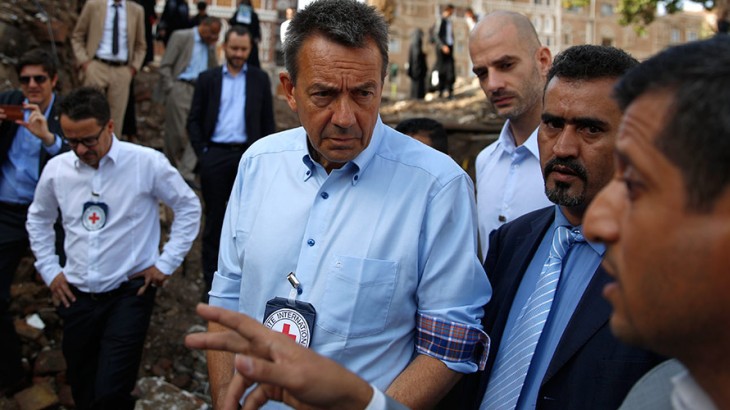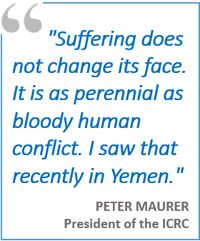 Appalled by the devastation he witnessed during a three-day visit to Yemen last month, ICRC President Peter Maurer said that the world must wake up to the suffering of those living in the country. Over 3,800 people have been killed since March this year and at least 1.3 million displaced. The situation has been deteriorating with each passing day without an end in sight.
Appalled by the devastation he witnessed during a three-day visit to Yemen last month, ICRC President Peter Maurer said that the world must wake up to the suffering of those living in the country. Over 3,800 people have been killed since March this year and at least 1.3 million displaced. The situation has been deteriorating with each passing day without an end in sight.
On 2 September, two of the ICRC’s staff in Yemen were shot dead. Behind these numbers are human tragedies cutting across all socio-economic and cultural groups — including young boys and girls, the elderly, toddlers, and people with disabilities. The landscape which was once dotted by beautiful homes, schools and playgrounds is now a perpetual battlefield.
 In an article in Newsweek, ICRC President Peter Maurer gives a vivid account of “Why the Red Cross Mends the Fabric of War-Torn Countries”.
In an article in Newsweek, ICRC President Peter Maurer gives a vivid account of “Why the Red Cross Mends the Fabric of War-Torn Countries”.
Here is an excerpt:
They say that truth is the first casualty of war. But there is another casualty as well: trust. As conflict escalates, trust between people and political leaders crumbles away as surely as night follows day. A vacuum is created. Shells land, people die, trust is gone.
In these environments, humanitarian organizations play a vital role; providing the aid that keeps people alive. But as conflicts become more protracted and complex, and as the ability of states to maintain the fabric of their societies dwindles, so the role of humanitarian organizations—particularly the ICRC—is changing. And in a fundamental way. Short-termism is no longer an option. We have to envisage humanitarian action with a medium and long-term perspective.
Article by Peter Maurer, president of the ICRC, published on the 15 September 2015 in Newsweek.

